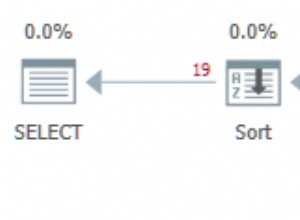Não faço ideia de por que você precisa de duas colunas com valores de incremento automático, não faz sentido ... mas se você insistir -
Você pode fazer isso em uma UDF ou SP dessa forma, você tem várias colunas incrementando automaticamente um valor.
EXEMPLO 1:PROCEDIMENTO ARMAZENADO (SP)
Tabela
CREATE TABLE tests (
test_id INT(10) NOT NULL PRIMARY KEY AUTO_INCREMENT,
test_num INT(10) NULL,
test_name VARCHAR(10) NOT NULL
);
Procedimento armazenado
DELIMITER $$
CREATE PROCEDURE autoInc (name VARCHAR(10))
BEGIN
DECLARE getCount INT(10);
SET getCount = (
SELECT COUNT(test_num)
FROM tests) + 1;
INSERT INTO tests (test_num, test_name)
VALUES (getCount, name);
END$$
DELIMITER ;
Ligue para o SP
CALL autoInc('one');
CALL autoInc('two');
CALL autoInc('three');
Procure a tabela
SELECT * FROM tests;
+---------+----------+-----------+
| test_id | test_num | test_name |
+---------+----------+-----------+
| 1 | 1 | one |
| 2 | 2 | two |
| 3 | 3 | three |
+---------+----------+-----------+
EXEMPLO 2:FUNÇÃO DEFINIDA PELO USUÁRIO (UDF)
Tabela
CREATE TABLE tests (
test_id INT(10) NOT NULL PRIMARY KEY AUTO_INCREMENT,
test_num INT(10) NULL,
test_name VARCHAR(10) NOT NULL
);
Função definida pelo usuário
DELIMITER $$
CREATE FUNCTION autoInc ()
RETURNS INT(10)
BEGIN
DECLARE getCount INT(10);
SET getCount = (
SELECT COUNT(test_num)
FROM tests) + 1;
RETURN getCount;
END$$
DELIMITER ;
Inserir usando a UDF
INSERT INTO tests (test_num, test_name) VALUES (autoInc(), 'one');
INSERT INTO tests (test_num, test_name) VALUES (autoInc(), 'two');
INSERT INTO tests (test_num, test_name) VALUES (autoInc(), 'three');
Procure a tabela
SELECT * FROM tests;
+---------+----------+-----------+
| test_id | test_num | test_name |
+---------+----------+-----------+
| 1 | 1 | one |
| 2 | 2 | two |
| 3 | 3 | three |
+---------+----------+-----------+
Estes foram testados e verificados. Eu pessoalmente usaria a função, é mais flexível.




